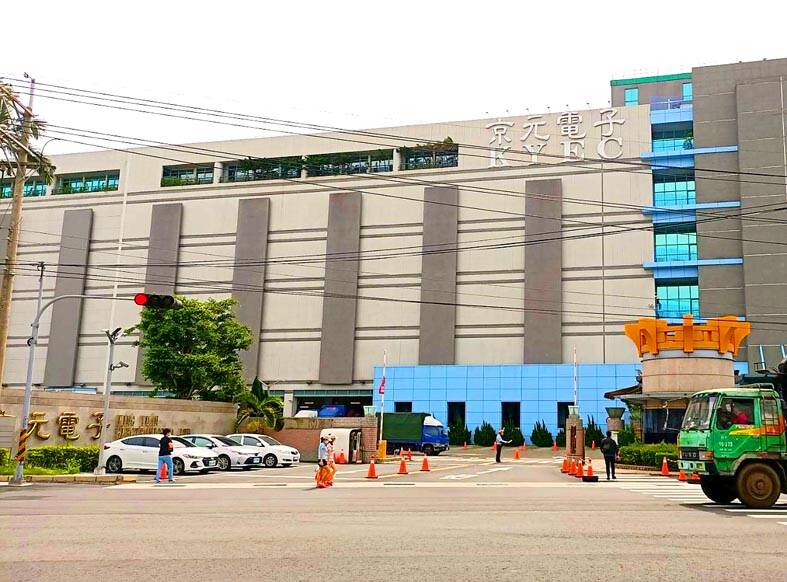Chip testing and packaging service provider King Yuan Electronics Co (京元電子) yesterday said it plans to divest its Chinese subsidiary amid heightened geopolitical tensions and a US-China trade dispute that led to a drastic shuffle of the global semiconductor supply chain landscape.
Intensifying competition in the Chinese chip market and changes in the ecosystem also prompted King Yuan to decide to exit China, the company said in a statement.
That decision is part of the company’s long-term growth strategies and financial resource allocations, it said.

Photo: Peng Chien-li, Taipei Times
King Yuan said it would shift its investment to Taiwan to catch up with fast-growing demand for chips used in mobile devices, vehicles, Internet of Things, high-performance computing (HPC) and artificial intelligence (AI) devices.
The company’s board of directors has approved increasing its capital expenditure this year to NT$12.28 billion (US$377 million), a rise of about 75 percent from an earlier NT$7 billion budget, to satisfy demand for AI and HPC devices. King Yuan is considered a major chip testing service provider to Nvidia Corp’s AI chips.
King Yuan said it plans to sell its 92.16 percent holding of King Long Technology (Suzhou) Ltd (京隆科技) in a 4.885 billion yuan (US$674 million) deal to a number of companies including King Legacy Investments Ltd, Dense Forest Ltd and other Chinese firms.
The deal would bring a NT$16.6 billion capital influx to Taiwan, the firm said.
King Yuan said it plans to use the capital to fund domestic factory and equipment expansion, and to invest in advanced testing equipment and research-and-development efforts.
The Hsinchu-based company said it expects to register a NT$3.83 billion asset gain from the share sale.
The company plans to allocate NT$3.67 billion from the gain to distribute an extra cash dividend of NT$1.5 per share next year and in 2026.

EXPRESSING GRATITUDE: Without its Taiwanese partners which are ‘working around the clock,’ Nvidia could not meet AI demand, CEO Jensen Huang said Taiwan Semiconductor Manufacturing Co (TSMC, 台積電) and US-based artificial intelligence (AI) chip designer Nvidia Corp have partnered with each other on silicon photonics development, Nvidia founder and CEO Jensen Huang (黃仁勳) said. Speaking with reporters after he met with TSMC chairman C.C. Wei (魏哲家) in Taipei on Friday, Huang said his company was working with the world’s largest contract chipmaker on silicon photonics, but admitted it was unlikely for the cooperation to yield results any time soon, and both sides would need several years to achieve concrete outcomes. To have a stake in the silicon photonics supply chain, TSMC and

IDENTITY: Compared with other platforms, TikTok’s algorithm pushes a ‘disproportionately high ratio’ of pro-China content, a study has found Young Taiwanese are increasingly consuming Chinese content on TikTok, which is changing their views on identity and making them less resistant toward China, researchers and politicians were cited as saying by foreign media. Asked to suggest the best survival strategy for a small country facing a powerful neighbor, students at National Chia-Yi Girls’ Senior High School said “Taiwan must do everything to avoid provoking China into attacking it,” the Financial Times wrote on Friday. Young Taiwanese between the ages of 20 and 24 in the past were the group who most strongly espoused a Taiwanese identity, but that is no longer

A magnitude 6.4 earthquake and several aftershocks battered southern Taiwan early this morning, causing houses and roads to collapse and leaving dozens injured and 50 people isolated in their village. A total of 26 people were reported injured and sent to hospitals due to the earthquake as of late this morning, according to the latest Ministry of Health and Welfare figures. In Sising Village (西興) of Chiayi County's Dapu Township (大埔), the location of the quake's epicenter, severe damage was seen and roads entering the village were blocked, isolating about 50 villagers. Another eight people who were originally trapped inside buildings in Tainan

‘ARMED GROUP’: Two defendants used Chinese funds to form the ‘Republic of China Taiwan Military Government,’ posing a threat to national security, prosecutors said A retired lieutenant general has been charged after using funds from China to recruit military personnel for an “armed” group that would assist invading Chinese forces, prosecutors said yesterday. The retired officer, Kao An-kuo (高安國), was among six people indicted for contravening the National Security Act (國家安全法), the High Prosecutors’ Office said in a statement. The group visited China multiple times, separately and together, from 2018 to last year, where they met Chinese military intelligence personnel for instructions and funding “to initiate and develop organizations for China,” prosecutors said. Their actions posed a “serious threat” to “national security and social stability,” the statement